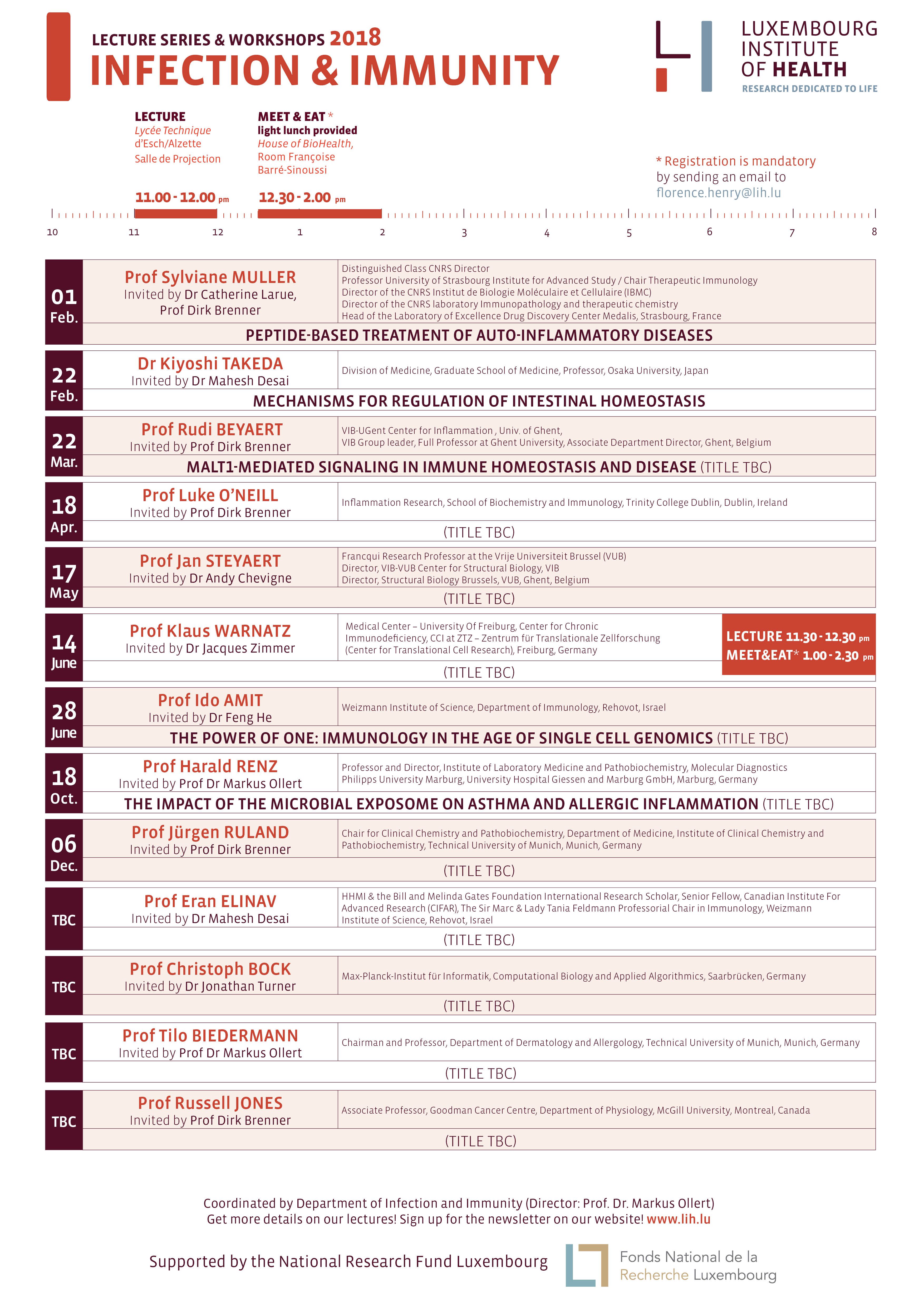Lecture Series "Infection & Immunity" - Prof Luke O'Neill - "FRONTIERS IN INFLAMMATION RESEARCH: FROM NLRP3 TO METABOLIC REPROGRAMMING"
18/04/2018 11:00 to 18/04/2018 14:00 (Europe/Luxembourg)
Esch/Alzette,
Luxembourg
Speaker
Prof Luke O'Neill is Chair of Biochemistry at Trinity College Dublin where he leads the Inflammation Research Group, Co-founder of 2 Spin-out companies - Opsona Therapeutics and Inflazome, Dublin, Ireland.

ABSTRACT
The discovery of the NLRP3 inflammasome provided an important component in the inflammatory process, revealing a key mechanisms underlying the induction of the central pro-inflammatory cytokine IL-1beta as well as IL-18 and a type of inflammatory cell death called pyroptosis. NLRP3 therefore emerged as a compelling therapeutic target for several inflammatory diseases, ranging from gout to osteoarthritis and even neurodegenerative diseases such as Parkinson’s disease and Alzheimer’s disease. We have developed highly specific inhibitors of NLRP3 which are have tremendous promise as a whole new class of drugs to treat inflammatory diseases. NLRP3 was also strongly implicated in metabolic diseases such as atherosclerosis and NASH. Work on NLRP3, IL-1beta and metabolism formed part of the renaissance of interest in immunometabolism, which in this context means intracellular metabolic changes occurring in immunity that are governing for immune and inflammatory effector mechanisms. Metabolic changes triggered by innate immune receptors have become a particular focus for researchers interested in immunity and inflammation. This area has direct relevance to inflammatory diseases such as rheumatoid arthritis since the rheumatoid joint is known to undergo a range of metabolic alterations and enzymes in glycolysis are well known autoantigens. Furthermore metabolites from the Krebs Cycle such as succinate have been found to be elevated in rheumatoid synovial fluid and act via the receptor SUCRN1 on macrophages to boost IL-1beta production. LPS-activated macrophages undergo metabolic reprogramming with a major increase in glycolysis, which is required for ATP production and also the generation of biosynthetic intermediates. Changes in the Krebs cycle also occur such that intermediates such as citrate are withdrawn for lipid biosynthesis. We have found a role for the Krebs cycle intermediate succinate in activated macrophages. Succinate induces HIF-1alpha and it’s target genes, which include that encoding IL-1beta, can act on the aforementioned succinate receptor SUCRN1 on cells (which can synergise with TLRs) also can be oxidised by Succinate Dehydrogenase which because of the high mitochondrial membrane potential leads to reverse electron transport (RET) via Complex I in the mitochondria. This drives ROS production with inflammatory consequences. Succinate might therefore act as important signal for inflammation. We have also found that inhibition of SDH leads to IL-10 production, indicating that this enzyme is a key arbiter of cytokine production. A second metabolite termed itaconate is derived from citrate and has profound anti-inflammatory effects acting via NRF2. These insights are providing a new view of metabolism in immunity and inflammation and might indicate new therapeutic approaches.
SCHEDULE
11:00 - 12:00 : LECTURE
Lycée Technique d'Esch/Alzette - Salle de projection audiovisuelle
12:30 - 14:00 : 'meet & eat'
House of BioHealth
Room Françoise Barré-Sinoussi
Registration required for the 'Meet & Eat' - send us an email.
About the Lecture & Workshop series - Infection & Immunity
The LIH Lecture Series and Workshops in Infection and Immunity, supported by the FNR, are gathering internationally recognised speakers to address topics around Infection and Immunity. Twelve lectures will be organised in 2018, followed by workshops especially dedicated to early-stage researchers. Please find here the full programme for 2018.
Attendance to the lectures and workshops are free of charge. Should you be interested in registering for the workshops, please feel free to do so by sending us an email.

